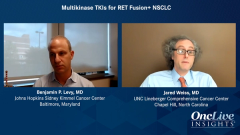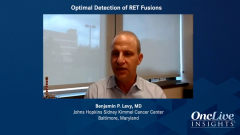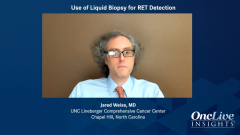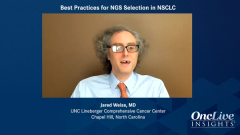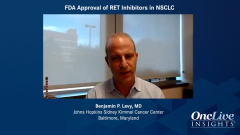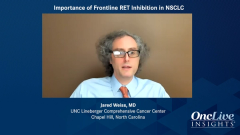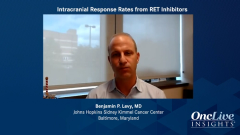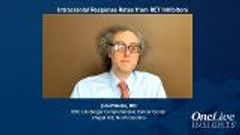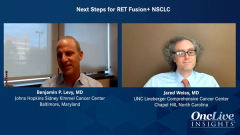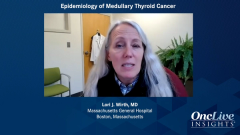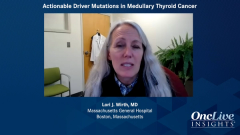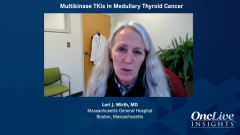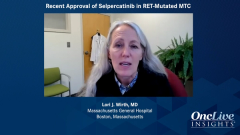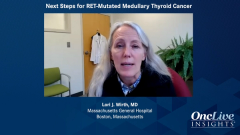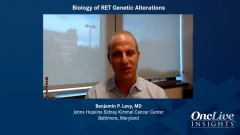
FDA Approval of RET Inhibitors in NSCLC
Episodes in this series

Benjamin P. Levy, MD: Let’s start with the FDA approval of pralsetinib and selpercatinib in RET fusion–positive lung cancer. You can start with the arrow. These are the more recent data that were presented and led to the second drug that is FDA approved. Why don't we start there with, with the pralsetinib data? We had an update from ASCO [the American Society of Clinical Oncology meeting 2020]. We had original presentations, and we’ve had some updates. Give us your 10,000-foot overview of the data and what you think.
Jared Weiss, MD: Well, at 10,000 feet, these are both beautiful drugs. These have limited adverse effects, and it's real targeted therapy. I should define what I mean by that. In lung cancer we have set a minimum bar of a response rate of about 60%, and a minimum PFS [progression-free survival] of about 10 months as the beginning of what we call true targeted therapy. And with modern agents, we've appropriately gotten greedier and expected better, both in terms of efficacy and tolerability, and we're seeing that here. We cleanly meet that bar, and we cleanly crush chemotherapy. We crush the so-called dirty TKIs [tyrosine kinase inhibitors] with both agents. I'll start with pralsetinib, but I do want to disclose, just to be frank, that I was a selpercatinib investigator. I believe you were as well, but these are both great drugs.
We're looking here at ASCO, at phase 1 dose escalation data, followed by a phase 2 dose expansion study, so no randomization here. Appropriate to the phase 1 design, the primary end points were response rate and safety. At ASCO, we saw data on 354 patients. Just over half of those had lung cancer. All patients were previously treated with a platinum doublet, and nearly half also had a PD-1 or PD-L1 inhibitor.
The intention-to-treat population response rate was 58%, and happily the median duration of response has not yet been reached, but the 95% confidence interval lower bound is 11.3 months. We know that even if everything terrible happens to every subsequent patient, we've met that bar. And of course, that doesn't look like it's happening. Now with modern TKIs, in addition to expecting that response rate to edge up, the toxicity to edge down, the PFS to edge up, we’ve also started to expect brain penetration. And we got that here. In a limited number of patients, pralsetinib certainly delivered. Nine patients entered the study with measurable intracranial disease. Intracranial response rate there was 56%, including some complete responders. Overall this is a very well-tolerated drug. We saw a number of low-grade toxicities, but very few at high grade. The most common of these were increased LFTs [liver function tests], anemia, constipation, and hypertension. And at high-grade, hypertension and neutropenia. I have no clinical experience with pralsetinib, but what I've heard from those who have had it is that this is a very good drug, very efficacious, rapid dramatic responses and very well tolerated. With that, I'll turn the tables on you and ask you to talk about selpercatinib.
Benjamin P. Levy, MD: You made my job easy, because the thing is, it is very similar. We can talk about cross-trial comparisons and the things that we do. But selpercatinib is a highly selective RET-directed therapy also recently published, you and I were both investigators in the study, in the New England Journal of Medicine and led to the FDA approval. It is looking at 105 patients who had RET fusion+ non–small cell lung cancer who had previously been treated with a line of platinum-based chemotherapy. Also included were roughly 40, 39 patients who were untreated. And similar to the pralsetinib data, the response rate for the 105 previously treated patients who had received platinum-based chemotherapy, the response rate was 65%. The duration of response—that's important. We talk about responses, but are these responses durable? The median duration of response in these patients was around 18 months. It's remarkable for a tyrosine kinase inhibitor, and probably is on the far end of duration of response for the tyrosine kinase inhibitors that I'm aware of for lung cancer, in terms of their ability to elicit durable responses. Looking at the roughly 40 patients who were treatment naive, it looked like a response rate close to 85% to 90%, it’s remarkable, with a duration of response that's ongoing.
Importantly, similar to the pralsetinib data, there were patients in this trial who had measurable central nervous system disease, or CNS metastases, who were enrolled, and the intercranial response was 91%. All the data that I share with you are highlighting why it got approved fairly quickly, similar to pralsetinib. The responses are meaningful, they happened in platinum-refractory patients as well as treatment-naive patients. The responses are not only meaningful but durable, with a median duration of response anywhere from 17 months to 20 months. And there is an intracranial response rate. These drugs can cross the blood-brain barrier and elicit meaningful responses in the brain. And as you and I know Jared, this alters the way that we marshal patients through treatment. Where they used to get radiation therapy, they can just get a TKI that can take care of disease above the neck and below the neck.
Looking at toxicities, we've put a fair amount of patients on this study. We can both agree the drug is very well tolerated. But looking at the toxicity, there were some VEGF toxicities here, hypertension was seen, grade 3 hypertension was seen in roughly 15% of patients, and then LFT abnormalities. And then an interesting adverse effect that I saw a couple of times in my patients is hyponatremia, which is a little bit of a challenge to manage. But overall, it is a very clean drug, a well-tolerated drug that elicits meaningful responses. For me, these are both a welcome change for the patients with RET fusion+ lung cancer.
Transcript Edited for Clarity


